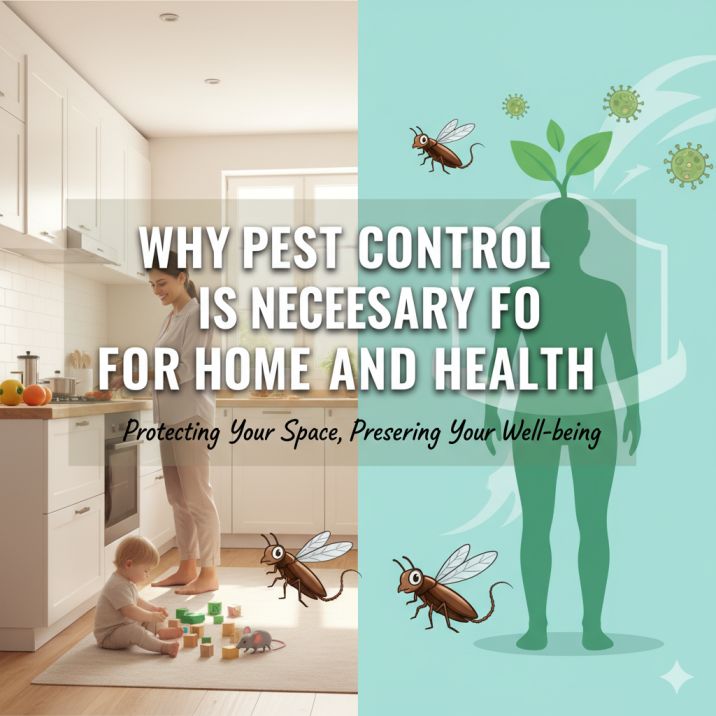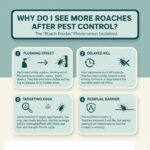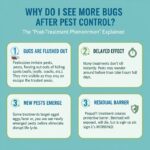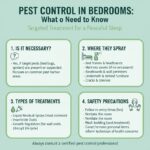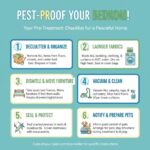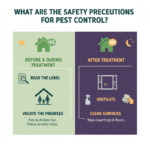Pests can invade homes and businesses silently, creating serious problems that often go unnoticed until significant damage occurs. Understanding why pest control is necessary is essential for protecting your health, property, and overall quality of life.
Pest infestations are not just an inconvenience. They can contaminate food, spread diseases, and weaken the structural integrity of your home. Additionally, ignoring pests can lead to costly repairs, health complications, and even long-term financial loss.
For residents in Cincinnati, Ohio, finding reliable pest control in Cincinnati helps protect homes, families, and businesses while maintaining a clean and safe environment.
What Pest Control Entails
Pest control is the systematic approach to managing and eliminating unwanted pests from residential and commercial environments. It is not limited to eradicating existing infestations; it also focuses on prevention.
Common pest control methods include:
-
Chemical treatments: Quick and effective solutions for severe infestations.
-
Eco-friendly solutions: Safe options for homes with children and pets.
-
Preventive strategies: Sealing entry points, reducing moisture, and proper sanitation practices.
For instance, sealing cracks in walls or maintaining clean kitchen areas can prevent ants and cockroaches from entering your home. These small preventive steps often make a big difference.
Common Pests and Their Risks
Various pests pose different threats, and understanding them is vital. Some of the most common pests include:
-
Rodents: Rats and mice can chew wires, damage insulation, and spread diseases.
-
Cockroaches and ants: These pests contaminate food and trigger allergic reactions or asthma.
-
Termites: Termites silently destroy wood structures, causing major financial damage.
-
Bed bugs: They feed on human blood and disrupt sleep, creating stress and discomfort.
-
Wildlife intruders: Squirrels, raccoons, and bats can damage property and carry diseases.
As a result, early pest detection is crucial. Homeowners who ignore small signs risk facing costly repairs and health problems later.
Health Implications of Pest Infestations
Pests are carriers of bacteria, viruses, and allergens that can seriously impact human health. Some examples include:
-
Rodents: Can transmit Hantavirus, Salmonella, and leptospirosis.
-
Cockroaches: Trigger asthma and allergic reactions, especially in children.
-
Mosquitoes: Can carry diseases such as West Nile virus or Zika.
-
Ticks: May transmit Lyme disease or other tick-borne illnesses.
Additionally, pests like bed bugs and fleas can cause skin irritation and sleep disruption, negatively affecting overall well-being. Regular pest management reduces these risks, creating a safer living environment.
Economic Consequences of Ignoring Pest Control
Pests can cause significant financial losses if left unchecked. Some economic impacts include:
-
Property damage: Termites, rodents, and other pests can compromise structural integrity, leading to expensive repairs.
-
Food contamination: In homes and businesses, pests can spoil food and contaminate storage areas.
-
Business losses: Restaurants, grocery stores, and warehouses may face inventory loss and regulatory fines.
Investing in professional pest control is often more cost-effective than repairing extensive damage caused by untreated infestations. Therefore, understanding the need for preventive pest management saves both money and stress in the long term.
Signs You Need Pest Control in Cincinnati
Early detection allows for faster, more effective intervention. Look for these warning signs:
-
Droppings, nests, or chewed furniture and wiring
-
Unusual odors or sounds in walls or attics
-
Live pest sightings, especially at night
-
Damage to stored food or personal belongings
Recognizing these signs and acting quickly helps prevent infestations from spreading. For example, noticing termite damage early can save thousands of dollars in structural repairs.
Benefits of Regular Pest Management in Cincinnati
Implementing a routine pest management plan offers numerous advantages:
-
Prevents severe infestations before they occur
-
Protects the health and safety of family members or employees
-
Reduces long-term property damage and repair costs
-
Maintains overall hygiene and property value
-
Offers peace of mind, knowing your home or business is protected
Furthermore, regular inspections allow professionals to identify hidden issues that homeowners may overlook, ensuring complete protection.
DIY Pest Control vs Professional Services
While DIY solutions can handle minor pest problems, professional pest control provides:
-
Accurate identification of pest species and their behavior
-
Safe, effective, and targeted treatment options
-
Long-term prevention strategies
-
Compliance with health and safety regulations
For instance, professional termite or rodent control often requires specialized equipment and chemicals that are not available to the average homeowner. As a result, professional services are more effective for serious or recurring infestations.
Conclusion
In conclusion, understanding why pest control is necessary in Cincinnati is vital for every homeowner and business owner. Pests are not only a nuisance—they can compromise health, property, and finances.
By taking proactive steps through regular inspections, preventive measures, and professional pest management, you can safeguard your home or workplace. Ultimately, investing in pest control ensures a safe, clean, and comfortable environment for everyone.

